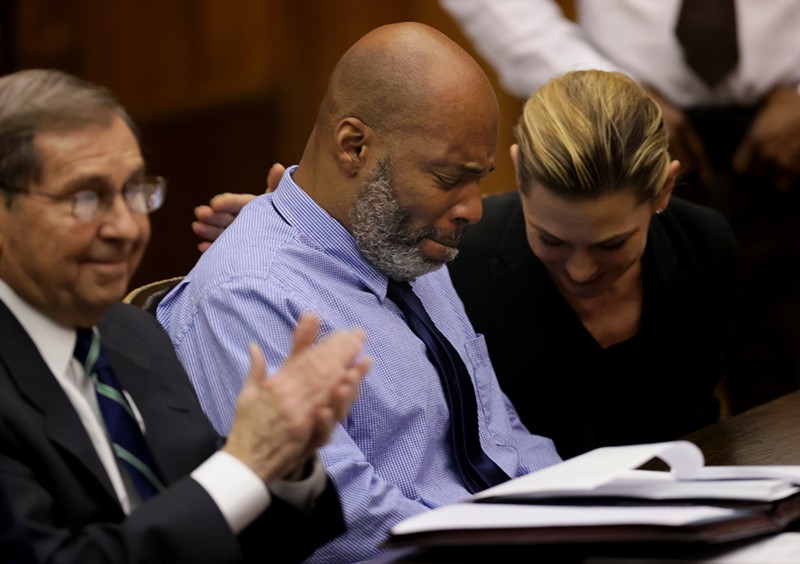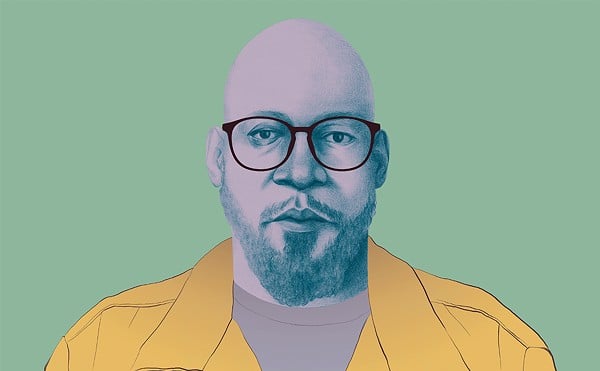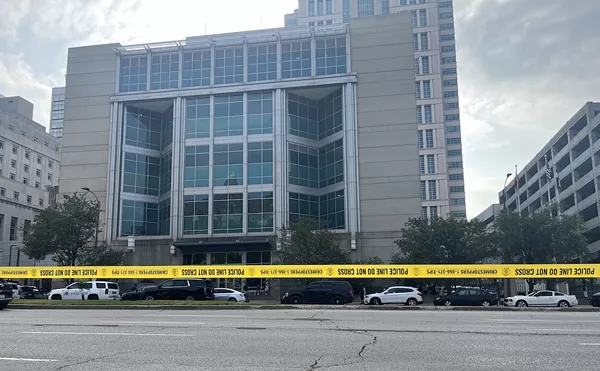
St. Louis Post-Dispatch
The courtroom erupted in applause when Lamar Johnson (center) found out his conviction was overturned.
After 28 years in prison, Lamar Johnson is a free man.
Johnson, 49, has been in prison for almost three decades after being found guilty of murdering Marcus Boyd in 1994. His story has repeatedly made national headlines and is often cited by advocates for reform in Missouri's handling of post-conviction claims of innocence.
Judge David Mason threw out the 1995 verdict today, saying he had to balance the validity of the original trial with subsequent evidence for innocence. Mason said that in making his ruling, he exhaustively reviewed the original trial's transcript and all subsequent evidence.
"I spent quite a bit of time on this. These cases are not easy," Mason said. "They should not be cavalierly ruled upon."
In his opinion he wrote "this court finds that there is clear and convincing evidence of Lamar Johnson's actual innocence."
When Mason announced his ruling, Johnson wiped away tears as the courtroom erupted in applause.
Mason's decision represents a win for St. Louis Circuit Attorney Kim Gardner's Conviction Integrity Unit, established in 2018 to review cases her own office had previously prosecuted under different leadership.
Johnson's case was the first exoneration case brought by the unit in 2019, and it has been slowly working its way through the courts ever since. En route to today's decision, the case was forced to make a lengthy detour to the state Supreme Court, where justices ruled that the state legislature would have to pass a new law allowing prosecutors to correct their office's own wrongful convictions. The legislature did so in 2021.
In December of last year, special prosecutors working with Gardner's office argued that two other men killed Boyd in 1994 and that Johnson's guilty verdict was based on testimony from a witness who was coerced into identifying Johnson as Boyd's killer.
In court on December 12, James Howard testified that he and a man named Phillip Campbell killed Boyd and that Johnson was nowhere near the scene of the crime.
Howard told the judge that, “I didn’t think they would convict him ... he had nothing to do with it."
In addition to Gardner's Conviction Integrity Unit, similar units have been established by St. Louis County prosecutor Wesley Bell and Jean Peters Baker, the prosecutor for Jackson County, which includes Kansas City. But just because these units were established doesn't mean that innocent incarcerated people immediately walk free. Post-conviction relief is a notoriously difficult area of law due in part to the fact that, legally speaking, a convicted individual's claim of innocence is in itself not adequate grounds upon which to bring an appeal.
When Howard testified that Johnson was innocent in December, that was hardly the first time he'd spoken up about the wrongful conviction. He signed numerous affidavits, the first in 2002, saying virtually the same things he said on the stand in December. Campbell, who is now deceased, wrote Johnson a letter saying as much before Johnson was even sentenced.
Adding to the legal difficulties of people like Johnson is that many state attorneys general have attempted to block avenues through which wrongfully convicted individuals could have their claims of innocence adjudicated. State attorneys general often take this stance for fear of eroding the power of a jury's verdict, leading to a situation which, according to one Arkansas assistant attorney general, would harm the "criminal justice system's interest in finality" and force prosecutors to "re-establish guilt" again and again.
Post-Dispatch columnist Tony Messenger pointed out in a column earlier this month that that office has always opposed post-conviction innocence cases, no matter if it was run by a Republican or Democrat.
"The office has consistently opposed freedom for people in Missouri prisons even when the evidence of innocence is overwhelming," Messenger wrote.
In the Johnson case, lawyers for the Circuit Attorney's Office wrote in court filings, “Over the past decade, in every instance where an innocent person was freed from custody, the AGO objected to a merits hearing and opposed relief."
Coming soon: Riverfront Times Daily newsletter. We’ll send you a handful of interesting St. Louis stories every morning. Subscribe now to not miss a thing.
Follow us: Google News | NewsBreak | Reddit | Instagram | Facebook | Twitter






